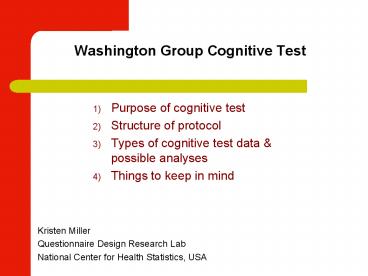Washington Group Cognitive Test - PowerPoint PPT Presentation
1 / 17
Title:
Washington Group Cognitive Test
Description:
Questionnaire Design Research Lab. National Center ... Purpose of Cognitive Testing. Interviews: Designed to examine the stages of the question response process ... – PowerPoint PPT presentation
Number of Views:35
Avg rating:3.0/5.0
Title: Washington Group Cognitive Test
1
Washington Group Cognitive Test
- Kristen Miller
- Questionnaire Design Research Lab
- National Center for Health Statistics, USA
- Purpose of cognitive test
- Structure of protocol
- Types of cognitive test data possible analyses
- Things to keep in mind
2
Purpose of Cognitive Testing
- Interviews Designed to examine the stages of the
question response process - Comprehension, retrieval, judgment, response
- Analysis Identifies
- potential response errors (e.g. vague concepts,
recall problems, inadequate response options) - patterns of interpretation
3
Traditional Cognitive Testing
- Protocol Semi-structured
- Data collected are qualitative
- Qualitative methodologies for analysis
- Small samples approx. 10 30 participants
4
Washington Group Protocol
- Structured Questionnaire
- Designed to illustrate
- Administration ease
- Interpretations
- Factors considered by respondent
- Degree of consistency with physical abilities
- Differences between subgroups
5
Cognitive Interview Protocol
- Demographic Section Country, language, gender,
age, SES - Question Testing Sections
- Core Question
- Interviewer Coding
- Open-ended Follow-up Probe
- Cognitive Follow-up Probe
- Functioning Follow-up Probe
- Health Questions subjective health, chronic
condition list - Interviewer Debriefing
6
Interviewer Code
- Did the respondent
- need you to repeat any part of the question?
Yes/No - have any difficulty using the response options?
Yes/No - ask for clarification or qualify their answer?
Yes/No
7
Percent of respondents with no response problems
- Vision 83.89
- Hearing 88.47
- Cognitive 85.72
- Mobility 91.03
- Self-care 93.65
- Communication 86.70
- N1,287
8
Number of response problems by age
9
Open-ended Follow-up Probe
- Can you tell me what you were thinking? Why did
you answer fill with respondents answer to the
core question?
10
Qualitative Data
- Varied in quality
- A lot missing
- Very brief
- Provides some insight
- E.g. Because I wear glasses
11
Cognitive Follow-up Probes
- How often they had difficulty
- The amount of effort they needed to put into the
activity - The degree of concern or worry they had regarding
the difficulty - Other domain-specific questions
- Communication Shyness question
- Cognitive Reason question
12
Cognition Cognitive Probe
- Do you believe that your memory or concentration
difficulties are - Mark all that apply
- because you have too many things to do?
- because you getting older?
- or, because of something else?
- Only busy 28.78
- Aging 25.84
- Something else 43.07
13
Reason by degree of problem
14
Functioning Follow-up Probes
- Presence of a condition
- Use of an assistive device
- Degree of difficulty doing related activities
15
Analysis of Functioning Data
- Examine the consistency between
- Washington Group Question responses and
- Follow-up functioning questions responses
- Goal explain the discrepancies
- Misunderstood word?
- Cultural difference?
- Translation problem?
- Interviewer error?
- Error in the follow-up questions?
- Other data assist in explanation
16
Response patterns Vision
17
Response patterns Hearing































